DEVELOPMENT
3,476
'Belief' - A Game Concept
6 years ago
I've spent the past few days working on a game idea inspired by my old projects, which feels like it could work! Essentially, it's a sort-of JRPG with a 'battle' system based around using social skills to control moods and convince people to believe in the god in your head.
I've experimented with a bunch of different ideas over the past few weeks - such as what the drawings were for in
∞ this post ∞ - but nothing was really sticking. I'm aware that a lot of people are quite fond of my old work though, and I got quite used to developing JRPGs in a particular way. There are a few ideas I'd really like to see the light of day too, but never managed to finish them in the past. So this idea is me combining things I liked about old ideas in a way that I hope might be interesting.
I was going to talk about the old projects that had inspired this one, but perhaps that's something I can write about another time. If you've been following me for a while, you'll be aware of them anyway. I'll just describe how this idea works.
![]()
![]()
It's a 'non-violent' JRPG, where the typical, familiar mechanics of essentially exchanging stat-based numbers to reach a goal represent social interactions rather than violence. Instead of depleting a health bar with
attacks to kill enemies, in this you increase their 'belief' bar by using social skills to to convince them of your cause.
The Story
You begin by playing as a young man and a young woman, who are on an adventure together to tame as many cute animals as they can to make her happy. She's all over him, singing his praises, and she moves in for a kiss...
Then he wakes up, alone. In reality, he's always been an outsider because his skin is a lot darker than the typical Bold who inhabit the Bronze Archipelago. He feels like an alien, and he's developed anxiety and depression as a result of the isolation. His world is shaken when he hears from his mother that people are all abuzz about a real alien craft which has appeared in a nearby forest. Feeling that this is more important than anything - "maybe they can even take me home, wherever that is!" - he musters up the courage to brave his anxieties and investigate.
He reaches what genuinely appears to be an alien craft, with an open door, and ventures anxiously inside. There, he finds a pilot - who has dark skin like him! - gravely wounded... being comforted by the protagonist's worst childhood tormentor (I'll tentatively call him "Flaymh" for now; it's ugly, but I'm trying to make all the names six characters long!). The pilot explains that the world's gods, the Aolmna, are gone, and his people have realised that the world is falling apart in their absence. To rectify this, they've captured some new gods to replace them, though limitations have presented themselves. The gods can't exist in the material world, so they need a host whose body they can share. Further, their power is drawn from the number of people who believe in them. With his final breaths, the pilot explains that he holds a god in his own mind, but can pass it on to someone else, and must, lest it be lost. Flaymh volunteers, but the god speaks up and says no, it feels that the protagonist would be a better fit, as he (the god) understands what it's like to be a misfit.
Now possessed, the protagonist is told that he must venture out into the world and convince people to believe in this new god, so then it might restore the world to its former glory. Quite a thing to ask someone like him! He understands that it's important to do this, and so his adventure begins.
Along the way, he meets up with the girl from his dream at the beginning, who he's fancied from afar for years. She's always been concerned about the environment, and the missing gods, so she's easily convinced to join him as a permanent companion... if her boyfriend,
Flaymh, can come along as well.
So as an awkward alliance, they go out into the world and try to convince everyone to believe in the protagonist's new god. Tricky, since he's never even believed in himself!
Game Goals
The structure of the game would be similar to Pokemon. In those (main series) games, you travel between towns, beating gym leaders to earn badges, with the Elite Four at the end. In this, you'd travel between towns (I'm imagining six) convincing their mayors to adopt your god as the new local religion, with the eventual aim to convince the island's Council to adopt it widely.
Instead of random battles, NPCs would trigger these battle-like encounters when you first interact with them. This means that the number of encounters is finite; it's possible to 'complete' a town by convincing everyone in it. You'd likely have to convince a certain percentage before you could try to convince the mayor, and some people might have requirements (eg quests) before before you can engage with them.
A couple of weeks ago, I tweeted these images of an experiment I'd made, to see whether I could translate the old techniques I used in my Flash RPGs into 3D:
![]()
I'm not sure whether to go in that deliberately clunky grid-based direction with the 'field' movement, but I like the nostalgic charm of it, so maybe?
Mechanics
![]()
The 'battles' are an extension of several ideas I've played around with in the past. I've already got them working, and I think they're really interesting to play around with even with these temporary graphics (if a game's fun to play even when your character is a white cube, that's a good sign).
Instead of having health and dealing damage, each character has an amount of 'belief', which starts at full for the protagonists and empty for the opposition. You use skills to accumulate this belief... though there are complexities. Unlike in typical RPGs where you can just bash away with various damaging skills until you're victorious, here you have to consider the personality of the individual people.
Each character has a set of 'runes' which determine their personality (Afx, AFG, RTJ, etc), and skills are associated with a rune as well. The runes show the character's position on three personality spectra: Abstract/Realistic (A-a-x-r-R), Feeling/Tough (F-f-x-t-T), and Grave/Jolly (G-g-x-j-J). So here, for example, Flaymh is very realistic, tough, and jolly, but not at all abstract, feeling, or grave. Matching runes produces greater effects (eg an Afx person using an A skill on an AtJ person) while dissimilar runes would produce little to no effect (eg the same person using an R skill). It's sort of complicated at first if it's unfamiliar, but it opens up a lot of possibilities, especially when some skills can alter targets' runes. I really like this because it combines gameplay with the character's actual mental nature. People aren't all just interchangeable 'units' flinging around violence.
Additionally, instead of the classical elements (fire, water, air, earth, etc), skills are associated with sentiments. There are six of these, again in opposing pairs: Amity/Enmity, Joy/Sorrow, and Desire/Fear. Characters can be afflicted with 'moods' for each of these; the Joy mood is Laughing, and the Enmity one is Angry, for example. The Amity one is Friendly, and a person can't be Friendly and Angry at the same time (though they can be Laughing and Angry at the same time because those are from different sentiment pairs). Skills that match the character's or the target's mood will double in effectiveness, while those that clash with their mood will be halved in effectiveness. So for example a Laughing person using a Joy skill (eg a joke) on another Laughing person will be 4x as effective, while the same person using a Sorrow skill will be 1/4x as effective. Again, it seems complicated on the surface, maybe, but it's elegant in its simplicity when you get used to it, and it makes intuitive sense. Also, you can't see it yet because there are no character graphics, but the moods would show on characters' faces, which in previous experience has been a mix between empathy-provoking and hilarious. Here's one of my older projects this was inspired by, for example:
![]()
(I used very similar mechanics in that - I've been developing these for years, across many failed projects - though there are differences this time around.)
The third major mechanic is called
excitement, and it's represented by the speed and size of a beating heart above the runes. This ranges from 0% to 100%, and some skills will 'rouse' it while others will 'calm' it. Skills' effectiveness is increased by both the user's and the target's excitement and dulled by a lack of excitement, so a highly excited person using a skill on another highly excited person will affect belief a huge amount, but that person is just as vulnerable themselves. Conversely, someone with low excitement won't affect others much, but won't be affected much either.
More than that, though - and this is unique to this game - each character has three skills, and their availability is determined by their excitement. They have a 'cold' skill which is available when their excitement is between 0 and 33%, a neutral one for 20% to 80%, and a 'hot' one for 66% to 100%. This leads to some really interesting dynamics!
![]()
(The 'hotness' of the colours surrounding the status circles shows how effective that skill would be at a glance, so you don't have to work out all the runes and moods stuff every time.)
For example, currently, the protagonist (called 'Prophet' here) struggles with anxiety and depression, and this is actually worked into the mechanics. He can deliver a 'sermon', which increases the belief level for all of the opponents; that's his primary goal. However, if his excitement level drops too low, he can only use a skill called 'Depression', which just lowers his own belief a little bit. If his excitement is too
high, though, he can only use Anxiety, which gives himself the Panic mood and actually
lowers belief for the opposition (since they're put off by him rather than convinced).
His two allies have skillsets that help him out. Here's all three of them:
Prophet
Hot - Anxiety (Feeling - Fear)
Gives self the Panic mood and slightly reduces the Belief of the opposing team.
Neutral - Sermon (Abstract - Joy)
Increases the Belief of the opposing team.
Cold - Depression (Feeling - Sorrow)
Slightly decreases own Belief.
Lacuna
Hot - Guided Meditation (Abstract - Joy)
Increases Belief and lowers excitement by 50% for the ally team.
Neutral - Listen (Feeling - Amity)
Gives self the Friendly mood, then increases target's belief, shifts their runes towards Feeling (Feeling+), lowers their excitement by 30%, and has a 30% chance of making them Friendly.
Cold - Empathise (Feeling - Amity)
Copies all the target's moods.
Flaymh
Hot - Ad Hominem (Tough - Enmity)
Makes the target Angry, and has a 20% each of also causing Crying or Panic. Increases their excitement by 30%.
Neutral - Critique (Tough - Enmity)
Increases the target's Belief, changes their runes towards Tough (Toughness+), and increases their excitement by 30%.
Cold - Rally (Tough - Enmity)
Increases excitement by 50% for the whole team and removes the Friendly mood for everyone.
It's probably harder to make sense of that if you've not seen the game in action, but I think this definitely leads to some more interesting interactions than just 'does damage of element and inflicts status effect' or 'heals'.
It's interesting designing skillsets for 'enemies' too. Here's one:
Lout
Hot - Wimp! (Tough - Enmity)
Increases the target's Belief, and has a 20% each of causing Crying, Angry, or Panic moods. Increases excitement by 30%.
Neutral - Racist Joke (Tough - Joy)
Increases belief for the whole protagonist party, and causes Angry with a 5% chance of also causing Laughing. Increases excitement by 100%.
Then, also increases the belief for own party, and causes Panic for everyone with a 5% chance of also causing Laughing. Increases excitement by 100%.
Cold - Flex (Tough - Enmity)
Shifts own runes towards Tough (Toughness++) and increases excitement by 20%. Then, has a 20% chance of making the target Panic.
As the protagonists, your aim is to increase the belief of the opposing team. They're trying to lower your belief. Belief represents, well,
belief in your 'side', your god. So when this Lout character decides to make a Racist Joke, everyone on
his team shifts their belief in favour of your team; they don't want to be on a team with him! Your team also becomes more convinced of their correctness; their belief increases. Additionally, all your party get Angry at him for it, and all
his team Panic out of embarrassment. Some people occasionally start laughing though! And everyone gets completely riled up. Additionally, his hot skill involves insulting someone, which only makes them more firmly stick to their current side; their belief
increases.
Things like this lead to some
really interesting dynamics, I think, but it gets even more interesting!
The aim is to increase the belief of the opposition. But, when you fill their belief bar, they
convert to your side! Once on your side, you can control them as one of your own party, and use their skills, with the direction of their belief affecting flipped (so if they used a skill on you that reduced your belief, when they were on your team it'd increase the opposing target's belief instead). The aim then is to get everyone on your side...
but if someone on your side has their belief depleted - including the main characters! - then they convert to the
opposing side; you lose when everyone is on that side.
I find this
extremely interesting, and it's what sets this idea apart from previous projects where I've tried to use similar mechanics. It means that characters like that Lout can become liabilities if you convert them early, so you have to really think about what you're doing. You can't just mash ATTACK until everything falls down dead!
I'm imagining each town inhabited by a number of NPCs, who each have an 'actually four blokes' thing going on, where you talk to them as an individual in the field but the 'battle' they trigger is against a number of characters. You wouldn't keep hold of the converts after encounters. Using varied runes and skillsets means every encounter would be different and would require some thought, just like how you'd have to consider the personalities of the people you were dealing with if you really were going around trying to convince people of something.
![]()
So that's the rough outline of this idea. In the past, I've tried to make games that spanned multiple chapters, but I always massively overestimated what I was capable of. I'm planning this to be told over a number of chapters as well, but rather than aiming for 8 like with MARDEK, or the ridiculous 20+ like with Taming Dreams, I'm aiming for either two or three, ideally three. One where things come together, one where they're threatened to fall apart, and a finale where everything gets resolved. I've got some plot things planned, but still need to work it out in more detail.
Those of you who've been following me for a while will see clearly which of my old work I've drawn on to come up with this. There's more I wanted to say about all that, but for now I'll leave it at this.
My next task is to add some rudimentary graphics. I'm trying to decide on the proportions, like how big to make the characters' heads. I want them to be quite big so then the moods can be really clearly shown, but not
too big, so... I'm experimenting. Weird little things like this take a surprising amount of time and thought!
![]()
(Here, I traced over character models from four of the old projects which inspired this one - interesting that I've used different proportions every time. Also that's just Gemma, the placeholder character I always draw, not someone from this game specifically. She's in the screenshot for that old game!)
![]()
Here's a huge gif showing some of the things that I've described. This 'battle' system took three days to make.
![]()
I'm using "Belief" as a the work-in-progress titile, since it's six characters long and also the whole point of the game!





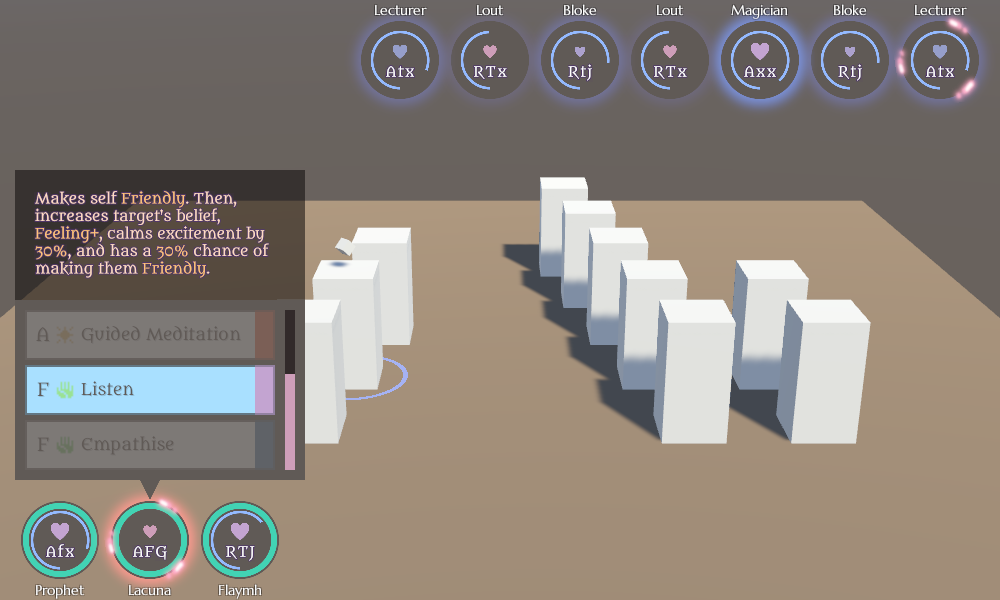
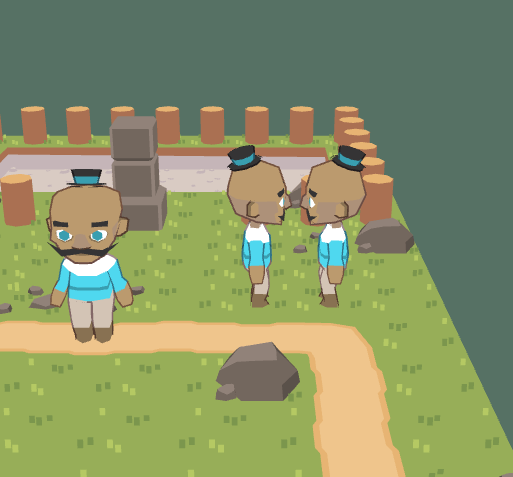
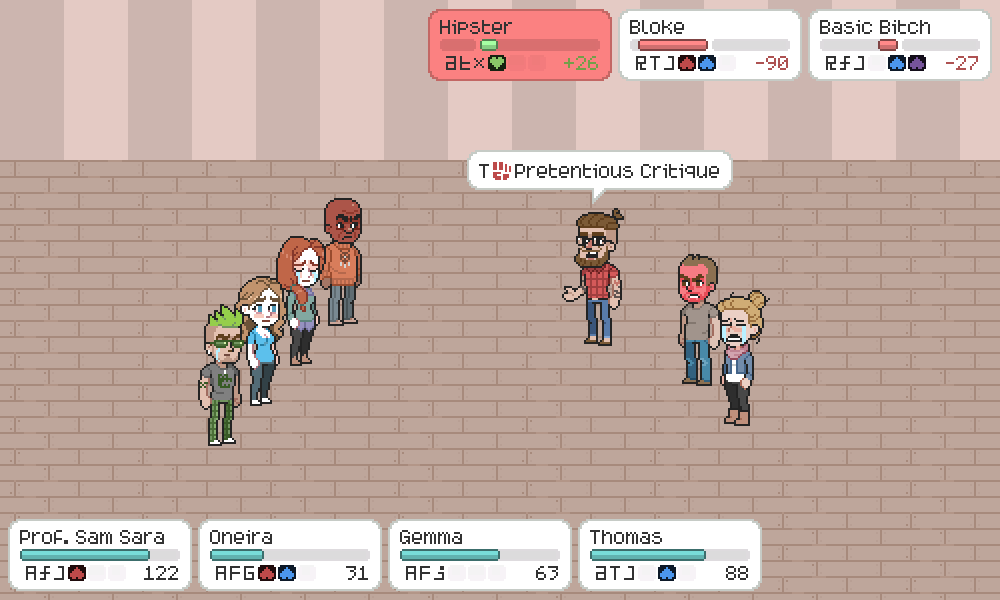
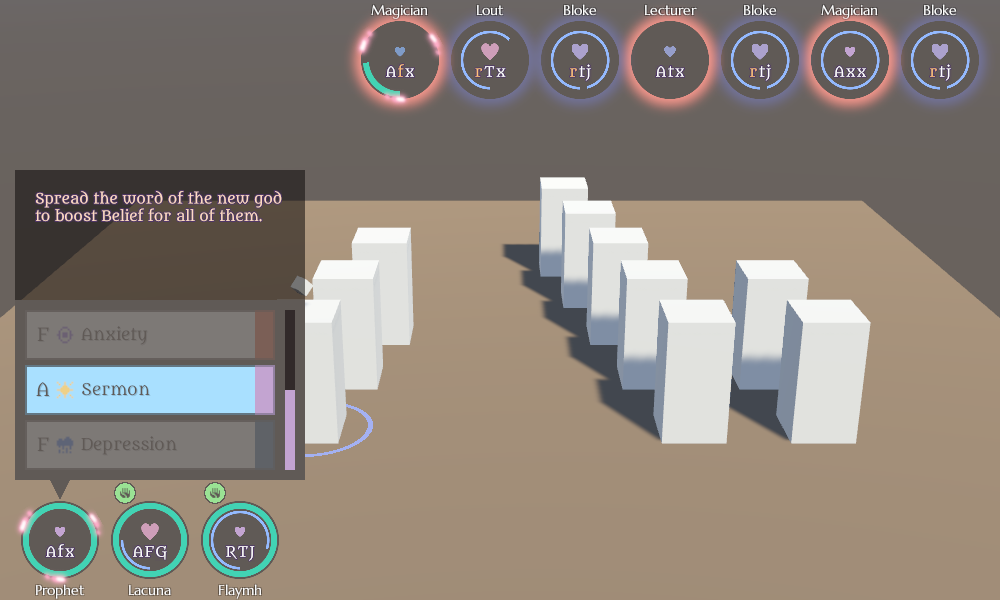

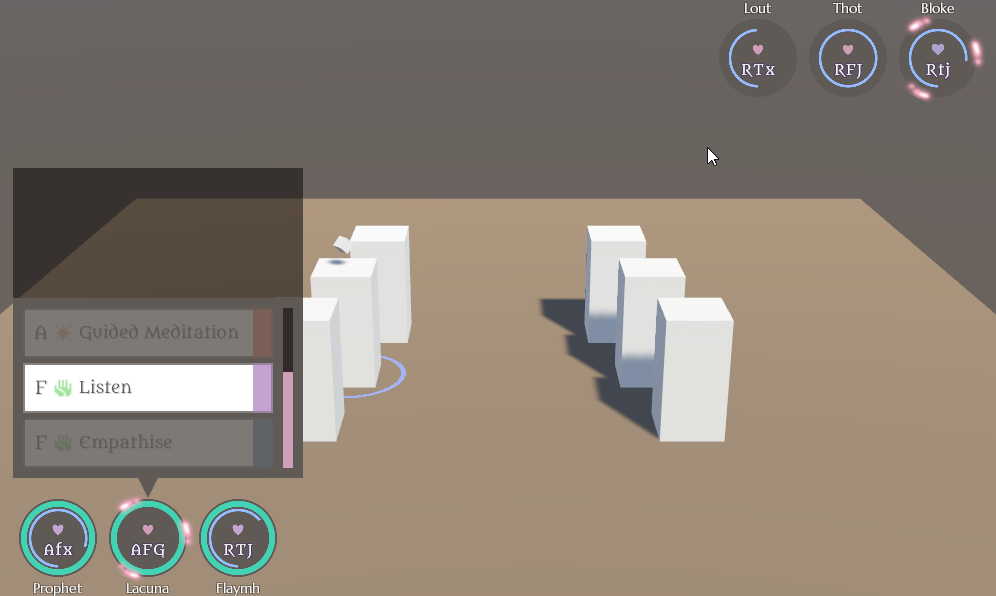
0